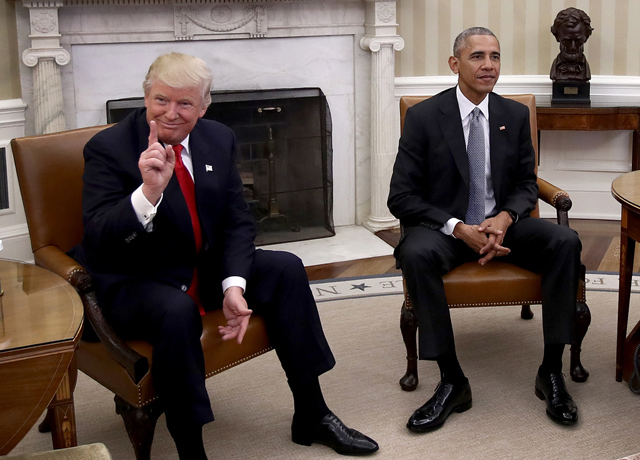Donald Trump has much to learn about a lot of things, including climate change. But he will learn nothing from Myron Ebell.

Donald Trump with Barak Obama in the Oval Office on 10 November. PHOTO Win McNamee/Getty Images
Every four years, till we’re sick of hearing it, US presidential candidates tell their electors and the world what a great country they seek to lead.
They’re right. America has great institutions, intellectual life, social diversity and cultural richness, from which billions of people, me included, draw great inspiration. It also has great flaws.
All this greatness – good, bad and very ugly – was laid bare in the excoriating 2016 election: democracy in action as we’ve never seen it before, capped by Donald Trump’s spectacular triumph.
Trump has much to learn about the job. The 66 days left before his inauguration will be a blur of activity for him and his team, and one of the busiest people in that team will be one Myron Ebell.
Since the 1990s Ebell has been a senior figure in the Competitive Enterprise Institute, a Washington think-tank whose corporate supporters include fossil fuel interests.
Trump has given him the job of leading the transition team dealing with the US Environmental Protection Agency – code for unpicking Barak Obama’s climate measures before Trump tosses them out.
Ebell is a public policy analyst with degrees in arts and political theory, whose mild manner and scholarly demeanour lend an air of respectability to the Trump camp.
That appearance is deceptive. In 1998 Ebell was one of the authors of a leaked fossil-fuel industry scheme to sow public doubt about man-made climate change, and has since dedicated his career to doing just that. He says otherwise, but effectively he’s an industry lobbyist.
In 2012 Trump said that global warming was “created by and for the Chinese in order to make US manufacturing non-competitive”. More recently he’s complained about “global warming bullshit”.
In a policy statement in the gas-rich state of North Dakota in May, Trump said he would back the Keystone tar-sands oil pipeline, save the US coal industry, rescind Obama’s emissions control measures and pull out of the Paris Agreement (which Australia finally ratified last week).
All that fits perfectly with Ebell’s life’s work. Charged by the president-elect with opening the pathways that will make it all happen, and buoyed by a compliant Republican-dominated congress, he is finally to have his time in the sun.
Asked in 2012 what he would do if he found he was wrong about climate change, Ebell said he’d say sorry and try to undo policies he had supported. Since then we’ve had the two warmest years on record, with 2016 all but certain to be the third in a row.
Over those four years the science supporting a climate crisis has only strengthened, underlined in a research paper about unmitigated emissions – the scenario envisaged by Ebell and Trump – published the day after the election in the journal Science Advances.
The US-German study found that the impact of greenhouse gases on temperature grows as Earth’s surface warms. Its modelling showed “business as usual” emissions warming the planet between 4.78C and 7.36C – far above previous calculations of a 4.8C maximum.
None of the above matters to Ebell. It’s not scientific evidence that moves him, but ideology. There’s been no apology from him, but plenty of spin.
Yet Trump might not prove the ogre many of us envisage. His motivators are neither evidence nor ideology, but the art of the deal. We’re used to thinking of pre-election statements as promises to be kept or broken, but Trump treats them as bargaining positions. Perhaps climate is another one.
Maybe all political establishments need a Trump shock now and again, as a reminder not to take power for granted. Maybe this political novice with a short attention span and a distrust of all things intellectual will prove an effective antidote to the toxic ideologies that have dogged us for so long.
The reckless appointment of Ebell to the Trump team needn’t be the whole story. Hillary Clinton’s best moment was her election-night advice to keep an open mind on Trump, and that’s what I intend to do. Because right now the alternative is too awful to contemplate.
